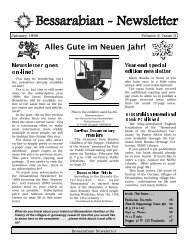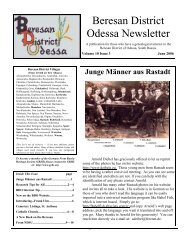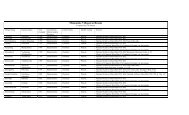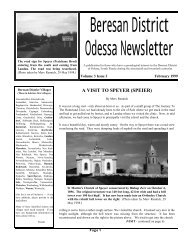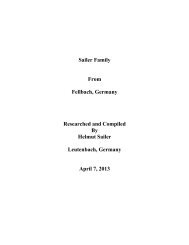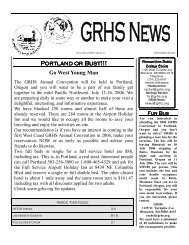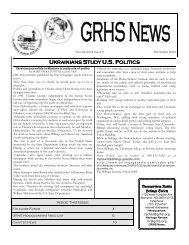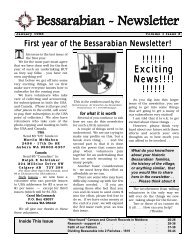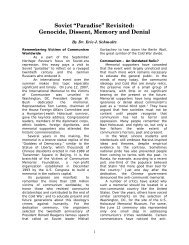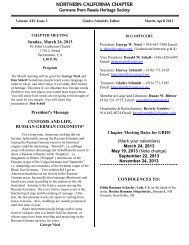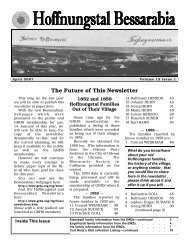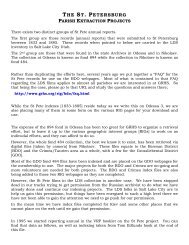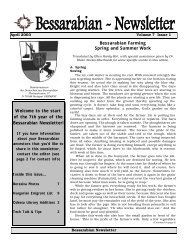Create successful ePaper yourself
Turn your PDF publications into a flip-book with our unique Google optimized e-Paper software.
The village sign for Waterloo, Beresan District<br />
(CTABKN or Stavky meaning city of ponds).<br />
(Photo by Merv Rennich taken 1 June 98)<br />
Beresan District Villages<br />
(Those in bold are first villages.)<br />
Alexanderfeld, Alexandrovka,<br />
Annenthal, Annovka, Antonowka,<br />
Bagdanovka, Benderhof, Biswanje,<br />
Christina, Christofovka, Domaneveka,<br />
Dvorjanka, Eigengut, Felsenburg,<br />
Friedensdorf, Friedrichstal,<br />
Gardegai, Gotta, Gradenfeld, Grise,<br />
Guldendorf, Halbstadt, Heck, Helenental,<br />
Hoffnungstal, Hoffnung,<br />
Hoffnungsburg, Johannestal, Kantakusenka,<br />
Kapitanovka, Karlevka,<br />
Karlsruhe, Katharinental, Kavkas,<br />
Klein Karlsruhe, Klundovo, Kratovka,<br />
Landau, Lerisk, Lichtenfeld,<br />
Lubo-Alexandrovka, Manov,<br />
Marienfeld, Marlanavka,<br />
Michaelowka, Munchen, Navaselevka,<br />
Neu Karlsruhe, Neu Lustdorf,<br />
Neu Munchen, Neu Rohrbach, Neu<br />
Speyer, Neu Worms, Neusatz, Novo-<br />
Amerika, Novonikolajevka, Olgino,<br />
Otschakov, Petrowka, Pokrovskaja,<br />
Rastadt, Rohrbach, Rosenthal,<br />
Savidovka, Schlosser, Schmatz,<br />
Schonfeld, Sebastiansfeld, Selingera,<br />
Skarupka, Sjepucha, Speir/Speyer,<br />
Stadnaja-Bulka, Steinberg, Steingut,<br />
Stuttgart, Sulz, Swenigorodka,<br />
Vossessensk, Waterloo, Weidenberg,<br />
Wilhelmathal, Wolksov,<br />
Worms, Wowtsche.<br />
(this list is not all inclusive — if you<br />
have additions, please provide to the<br />
lead editor)<br />
Many of these identified chutors and<br />
villages need much research. If you<br />
have any background information on<br />
them, please with us.<br />
� ����������� ��� ����� ��� ���� � ������������ �������� �� ��� ������� ��������<br />
�� ������� ����� ������ ������ ��� ���������� ��� ��������� ����������<br />
Volume 3 Issue 2 October 1998<br />
Through the German Colonies of the Beresan District<br />
By Hermann Bachmann<br />
Translated by Roland Wagner<br />
(Editor’s note: This is a continuation from the last issue of the Beresan District Odessa Newsletter<br />
Volume 3 Issue 1 June 1998 which also contains the translator’s introductory comments. In summary,<br />
Hermann Bachmann was involved in a scholarly research project on folk song and dialect literature.<br />
During the summer of 1927, he and Victor Schirmunski, a professor of German Language and Literature<br />
at the University of Leningrad toured the Beresan colonies, wandering from village to village collecting<br />
songs and stories and recording them. It is from these accounts that Bachman wrote his book from which<br />
the following was taken.)<br />
WATERLOO<br />
(Summer of 1927)<br />
Good horses have always been the pride of the<br />
German farmers in the colonies. They were<br />
groomed, brushed, and washed so that they<br />
always had shiny coats. When a colonist rode<br />
through the village streets, his pride reached a<br />
high point if the rear wheels of his wagon<br />
hovered more in the air than touching the<br />
ground, and if the residents became speechless<br />
with fear and trembling at the sight. [Trans.<br />
note: farmers loved to show off by galloping<br />
into the village. This custom may have been<br />
adopted from the Russians. Tolstoy once remarked<br />
that “the Russians harness their horses<br />
very slowly, they ride with great speed”.]<br />
Our driver, Vetter Pius, couldn’t shine like this<br />
with his horses: they weren’t first-class in<br />
breed or training, and also they lacked a strong<br />
body, but nevertheless they brought no shame<br />
to him in the village. He drove rather quickly<br />
through the stream past those who were stuck,<br />
since we two travelers were light baggage.<br />
���� �<br />
This time we didn’t care much about the thick<br />
rain of mud drops. We were happy that we<br />
were moving forward so quickly because it is a<br />
good 20 kilometers from Rastatt to Waterloo,<br />
and we took little pleasure in the journey due to<br />
the burning August sun. Vetter Pius also<br />
seemed to be seriously intent, since he shouted<br />
loudly at his horses, emphasizing the strong<br />
sounding words with an urgent whip over the<br />
backs of his browns. But they weren’t stupid.<br />
First of all, they knew very well that the pride<br />
of their owner depended on them while they<br />
were on display in the village streets, and they<br />
accelerated their steps whenever we entered a<br />
settlement. Secondly, they soon noticed that<br />
Uncle Pius didn’t use a real whip, but only a<br />
long, light switch. Words alone weren’t<br />
enough for this breed. It didn’t seem to concern<br />
them that they had a professor and a<br />
Soviet school teacher in the wagon. They<br />
made it easy on<br />
(WATERLOO - continued on page 3)
Newsletter Line-up<br />
Lead Editor Merv Rennich / R060<br />
Assistant Editor Leo Gottier / G089<br />
Assistant Editor Carol McCormack /M150<br />
Assistant Editor Roland Wagner / W011<br />
Assistant Editor Dale Lee Wahl / W078<br />
Subscriptions Arletta Baskins / B115<br />
Archives:<br />
Maps Jeff Hatzenbeller<br />
Village Coordinators:<br />
Felsenburg George Hoff / H072<br />
Guldendorf Curt Renz / R022<br />
Johannestal Carol Fuchs / F061<br />
Johannestal Ray Heinle<br />
Landau Diane Wandler / W090<br />
Landau Zita Gieser<br />
Neu Lustdorf Elsie Heuther / H008<br />
Neusatz Ken Aisenbrey / A013<br />
Rastadt Diane Wandler / W090<br />
Rastadt Letty Schoch / S193<br />
Rohrbach Arletta Baskins / B115<br />
Rohrbach Rosemarie Dinkel / D022<br />
Rohrbach Nancy Schroeder<br />
Rohrbach Ed Schulz / S043<br />
Rohrbach Lucy Simpson / S046<br />
Speier Albert Berger<br />
Speier Valerie Ingram / I009<br />
Sulz Albert Berger<br />
Sulz Valerie Ingram / I009<br />
Waterloo Betty Rennich / R103<br />
Waterloo Lucy Simpson / S046<br />
Weidenberg Richard m Heli<br />
Worms Arletta Baskins / B115<br />
Worms Mary-Lynne Harding/H187<br />
Worms Nancy Schroeder<br />
Worms Ed Schulz / S043<br />
Worms Lucy Simpson / S046<br />
Worms Dale Lee Wahl / W078<br />
(The addresses for most of the Editors and most<br />
of the Village Coordinators can be found in the<br />
latest issue of the <strong>GRHS</strong> Der Stammbaum.)<br />
SCRIPTURE LESSON<br />
“With the ancient is wisdom; and in length<br />
of years understanding.”<br />
The Old Testament, Job<br />
Volume 3 Issue 2: October 1998 Beresan District Odessa Newsletter<br />
Bertha Biel<br />
118 Alder Ave.<br />
Dickinson, ND 58601<br />
���� �<br />
LETTERS<br />
The enclosed picture is of my grandparents. My father is Nicolas. My<br />
Grandmother Elizabeth was a Dillman. Her mother was a Bochert. But I<br />
cannot seem to find out any more of the Bochert family.<br />
The Jacob and Elizabeth Dillman Muth Family<br />
Jacob (1847-1927) and Elizabeth Dillman Muth (1850-1928) and<br />
their children Nickolas, Valentine, Martin, Elizabeth, Jacob, Constantine,<br />
and Anna. They emigrated from the Karlsruhe colony in<br />
the Beresan Enclave near the Black Sea in Russia. They arrived at<br />
Dickinson, North Dakota, December 24, 1902. They homesteaded<br />
fourteen miles southeast of Dickinson. (The picture was taken in<br />
Russia about 1900).<br />
I f any<br />
one has any information on the Bochert family I’d be real happy to receive it.<br />
The Muths lived in Karlsruhe but the Dillmans lived in Katharinental.<br />
Laura Turnbull<br />
Grande Prairie, Alberta<br />
�����<br />
For those interested, the Hillside Cemetery in Medicine Hat was recorded and<br />
published by the Alberta Genealogical Society in March 1996. The publication<br />
contains 6,901 entries. It is available for purchase from the society. You can<br />
find the listing for it on their website at:<br />
http://www.telusplanet.net/public/turnbl/ags/<br />
LETTERS - continued on page 7
WATERLOO - continued from page 1.<br />
themselves and traveled at the speed that they wanted. One of<br />
the browns tossed his head in pleasure a little to the side since<br />
the bit had fallen out of his mouth and the halter hung<br />
underneath him. The other horse nodded forward with his<br />
head and responded to the motion of his leader with an<br />
audible “Phr!,” which in horse language means “napplewatj”<br />
[“you can take the lead, I don’t give a damn”].<br />
Vetter Pius thought up a scheme. He jumped down from the<br />
wagon, plucked a huge sunflower stalk out of the ground,<br />
climbed back into the carriage with a brisk expletive, and<br />
swung it with a thunderous shout that shattered the air. That<br />
worked for a moment. The browns gave a jolt that made us<br />
both almost fall over backwards. But then they let up because<br />
they saw through the ruse. Vetter Pius waved the sunflower<br />
stalk once again, but it didn’t do any good so he threw the<br />
newly discovered tool aside.<br />
I don’t know what kind of a mood these dead-beasts are in<br />
today” [“Ich wäss nit, was die Verreckling heit fer mucke<br />
hän”], he said, turning to us, letting the reins drop. Apparently<br />
he had run out of ideas. From time to time he turned to his<br />
nephew, a little two year old boy that he had brought with him,<br />
sitting to his right on the seat, and wiped his nose drippings<br />
with a deft finger-stroke.<br />
The professor and I exchanged our impressions of Rastatt and<br />
speculated about what we would find in Waterloo. Later we<br />
passed the time by watching the shimmering heat waves in the<br />
distance. The endless steppes lay stretched out before us. Far<br />
in the distance we saw a wagon that looked like it was floating<br />
in the air above a stretch of the earth. It looked like it was<br />
floating on a transparent strip of water over the earth and on<br />
this small bridge the shimmering and distorted outline of a<br />
large wagon was moving.<br />
After we had traveled for about two hours, the swaying tree<br />
tops of Waterloo appeared over the twinkling, silver streaked<br />
heat waves. Soon shining surfaces became visible from there:<br />
the sun playing off the tile roofs. It was a completely magical<br />
sight: a mixture of wavering air currents, mist, sparkles, hazy<br />
green. As we approached the shimmering white of the houses,<br />
we were totally blinded by the glare and the light.<br />
We drove into Waterloo. Aside from barking dogs on the<br />
street, no one else was to be seen. But behind the rows of<br />
houses, on the threshing ground, there was the sound of<br />
rumbling machines and threshing straw.<br />
We had to wait for awhile, looking around. Finally we<br />
discovered a young woman by one of the houses who could<br />
tell us where the man lived with whom we intended to stay.<br />
He was a former teacher. When we entered the front room,<br />
Volume 3 Issue 2: October 1998 Beresan District Odessa Newsletter<br />
���� �<br />
The main street of Waterloo.<br />
(photo taken by Merv Rennich 1 June 1998)<br />
we encountered a woman who was washing the floor, since it<br />
was Saturday [“Sonnabend”]. She looked at us with an<br />
inquisitive glance. We introduced ourselves and inquired<br />
about the house-holder [“Wirt”].<br />
“He is not home just now” [“Er isch grad net drhähme”], said<br />
the woman in Rohrbach dialect, “but he must come back soon,<br />
he went out into the field with the surveyor. We are having<br />
our land divided up” [“awer er muss bol kumma, er isch uf’s<br />
Feld mit’m Londmässer. Bai uns wered jetzt groht’s Lond<br />
verschnitte”].<br />
She led us into the living room, invited us to sit down, and<br />
returned to her work. We marveled at the beautifully furnished<br />
and painfully clean room. A pump-organ stood in the<br />
middle, next to a huge cabinet, forming an artful dividing wall<br />
between the front and the rear part of the room which was<br />
used for sleeping. A beautifully hand-painted oven, done in<br />
oil paints by a colonist artist, loomed across the room. The<br />
oven paintings drew our attention. We observed the pictures.<br />
There were two fantastic landscapes. One of them depicted a<br />
high cliff with a medieval castle on it overlooking the ocean.<br />
On the ocean there were boats and ships, with people sitting<br />
and standing in them, who were disproportionately large and<br />
who appeared to be stiff. In the other picture there was a flat<br />
seashore with some trees growing on it and some house-gables<br />
in the background. This picture also took great liberties with<br />
proportion and perspective, although the whole thing made a<br />
pleasant, naïve impression. This style of art is especially<br />
common in the colonies of the Beresan district.<br />
Soon the house-holder returned home. While speaking with<br />
him, I made the fortuitous discovery that one of my former<br />
school mates, a Rohrbacher, lived here. I immediately went<br />
WATERLOO - continued on page 4
WATERLOO - continued from page 3.<br />
to see him. There I found out that his 17 year old daughter<br />
was a passionate folk-singer. “Fünfmalhunderttausand Mann<br />
die zogen ins Manöver,” “Herzaller - lieber mein,” “in einem<br />
Städtchen, in einem finstern Tale,” the girl sang for me<br />
spontaneously, and I recorded the melodies.<br />
On my way back I bought a kilo of pears from the fruit-seller,<br />
which for lack of wrapping paper I had to carry in my hat, and<br />
I took a closer look at Waterloo.<br />
The overview is easy to describe: a broad street, decorated by<br />
bushy trees on both sides. Behind the one row of houses some<br />
ponds were visible, which made an attractive contrast to the<br />
houses and the trees. In the middle of the village there was a<br />
co-op store, with little merchandise in it other than some<br />
strong smoked herring. Opposite it on the other side of the<br />
street was a pretty school house and the post office.<br />
The people looked at me as a remarkable example of human-<br />
The German Evangelical Church located in Waterloo now<br />
turned into a school. Note the steeple is missing. Picture<br />
taken by Merv Rennich 1 June 1998.<br />
ity.<br />
“He must be a stupid fellow, he doesn’t have any cap on”<br />
[“des muss ein närrisher Kerl sie, der hat jo koi Kapp uf”],<br />
many of the Waterlooer residents probably said about me.<br />
To the colonists, it was offensive if someone walked through<br />
the village without something on his head. It was also<br />
improper that I was casually biting my pear as I was doing<br />
this. If I had been shelling sunflower seeds and if the shells<br />
had been flying in all directions, it wouldn’t have been as<br />
conspicuous since this was a common pastime. On Sundays<br />
there was hardly a boy or girl who didn’t indulge in this<br />
pleasure. It was even a communal pleasure. A group of<br />
young men could spend hours doing this together in silence:<br />
Volume 3 Issue 2: October 1998 Beresan District Odessa Newsletter<br />
���� �<br />
The old German school in Waterloo left to go to ruin.<br />
Photo taken by Merv Rennich June 1, 1998.<br />
in this way it became a group project. There were solitary<br />
seed-chewers [“Kernekiefer”], who had developed a particular<br />
dexterity. Just as the wooden-tongue of the threshing machine<br />
spews out the straw, so also the shells of the seeds flew out of<br />
their mouths and over their lips. And just as you could tell<br />
where a threshing machine once stood, so also on Monday<br />
mornings you could easily tell where the gathering place of<br />
the seed-chewers was by the piles of shells. The fathers and<br />
mothers in the families also happily preoccupied themselves<br />
with this activity on Sunday afternoons. The only ones who<br />
couldn’t join in were the toothless old people.<br />
On my return trip I spoke with a young fellow who impressed<br />
me because of his glasses and his somewhat intelligent appearance.<br />
He was one of those young people who, after<br />
graduating from the village school, had the desire for further<br />
education, but couldn’t get it, either because his father was<br />
against it, or because he lacked the necessary finances. For<br />
this boy the latter was the case. He had studied and studied,<br />
formulated great plans in his mind for the future, read through<br />
all the books that came his way, and now he was the secretary<br />
of the village council [“Sekretär des Dorfrates”] and studied<br />
village law [“Dorfkanzlerei”] in three languages: German,<br />
Russian, and Ukrainian. He very willingly offered to help me<br />
and promised to get me the best singers in the village.<br />
But when evening came and the promised singers should have<br />
been there, my young fellow appeared, alone and annoyed,<br />
with the following announcement: ”the boys don’t want to<br />
come, they are afraid. They claim that the two men might<br />
have come here to record the singers so that the regional<br />
executive committee [“Rayonvollzugskomitee”], which had<br />
forbidden singing in the streets, could punish them.”<br />
WATERLOO - continued on page 5
WATERLOO - continued from page 4.<br />
The situation was delicate. There was a danger that the<br />
evening would be wasted, or even that Waterloo itself would<br />
be a lost cause. I went with the secretary, who was known in<br />
the village, to meet the boys. They were supposed to be<br />
outside on the street. But we didn’t find anyone: all were<br />
gone. We encountered two near the edge of the village who<br />
were standing in front of the courtyard walls of their houses.<br />
I spoke very politely with them, and said first of all that I was<br />
also a German colonist and that I came from the neighboring<br />
village of Rohrbach. Then I explained why the professor and<br />
I had traveled to the village, explained that we already had<br />
been to Rastatt, praised the Rastatter singers, mentioned a few<br />
songs from there, hummed the beginnings of a few of the<br />
melodies, and asked them if people also sang like that in<br />
Waterloo.<br />
The ice was broken: my boys were enthusiastic. After a few<br />
minutes some others gathered, among whom we found the<br />
lead-singer[“Hauptvorsänger”], we went to our quarters. The<br />
boy had now become so enthusiastic that he wanted to give a<br />
demonstration of his skill. He let me have a head start of a<br />
few notes and then harmonized after me with full voice the<br />
song “Berlin is a beautiful city.”<br />
Even today every detail of this song sounds in my ears. Also,<br />
it was sung in pure colonist fashion and I noticed the difference<br />
between the styles of the Waterlooers and the Rastatters.<br />
The latter no longer sing so naturally: the musical hand of the<br />
sexton had already been strongly felt there. But in Waterloo<br />
you notice nothing of polish; here the boys sing completely in<br />
a colonist style.<br />
The lead singer [“Vorsänger”] led the total chorus. With a<br />
strong beginning statement he started the first words of the<br />
strophe, then the other six or eight men fell in, the so-called<br />
Nachsänger, with a forceful background. The first voice<br />
usually sings so high that you get the feeling that he might<br />
break away (from the others). But this never happens with a<br />
“good” Vorsänger. Usually the most important condition for<br />
his reputation in the village depends on his ability to sing<br />
higher than the other men. The second major requirement is<br />
that he must be able to stand out strongly against the combined<br />
tones of all the Nachsänger. Each one makes every<br />
effort to reach the strongest tones. The strength of the lungs<br />
of these youths is astounding.<br />
Formal training in singing usually does not give attention to<br />
the development of such high and strong notes. If the breath<br />
gives out in the middle of a word, the melody is usually<br />
broken off without thinking, a deep breath is drawn and the<br />
second half of the word is sung with a new position, which is<br />
like an “H,” similar to the breath of a bellows of a blacksmith.<br />
Volume 3 Issue 2: October 1998 Beresan District Odessa Newsletter<br />
���� �<br />
“Berlin is a beautiful city, there-’hin’ are many soldiers.<br />
Some Nachsänger even have the ability to strongly belt out the<br />
last syllable one more time as the Vorsänger sings the final<br />
tone of the stanza.<br />
Yes, anyone who wants to hear authentic colonist style singing<br />
should travel to Waterloo, and there he will find it still in its<br />
pure form.<br />
The professor and our host were waiting for us in front of the<br />
courtyard door. We stopped and the singers gave us yet<br />
another demonstration of their skill. Now an extraordinary<br />
moment came for the youths. They had never before seen<br />
such a thing in their lives. The professor placed a small<br />
box-shaped container on the table and opened it. Beneath the<br />
folded-back lid a machine was visible which looked like a<br />
gramophone, only without the horn. The professor pulled out<br />
a key and began to wind it up, just like a gramophone. The<br />
youths watched in silent fascination. Finally the professor set<br />
a record on the machine, since it really was a gramophone.<br />
“Now one of you must sing here into the tube,” he said, “and<br />
if you do this we will be able to sing the same thing back<br />
again. You will then be able to hear your own voice. Now,<br />
who will begin?”<br />
No answer.<br />
“The Vorsänger will do it,” I said and nodded to him.<br />
“Nah, I can’t do it,” he replied. “Johann should do it, he can<br />
do it better” [“Jo, des kann ich nett, do dr Johann soll<br />
einsinge, der kann’s besser”].<br />
“I?! Get out of here! What will I sing?” [“Ich?! Jo, geh doch!<br />
Was wer ich do neisinge!”].<br />
None dared do it. But the curiosity was too great. Now they<br />
began to banter among themselves. The voices became louder<br />
and louder. Our hostess’s eyes shone with curiosity.<br />
“Just go ahead and do it, boys,” she said. “What kind of<br />
singers are you if you are so afraid of the machine!” [“Awer<br />
hären doch ämol, Buwe, wos sin ier fer Singer, wenn ‘r far<br />
däre Maschin do Angscht hän!?”]. But this also didn’t work.<br />
Suddenly the Vorsänger raised up, tossed his hat onto the<br />
window ledge like a card-player slamming down his cards<br />
when he is plays va-banque, stepped up to the gramophone,<br />
sat on the stool in front of it and awaited further instruction.<br />
WATERLOO - continued on page 6<br />
WATERLOO - continued from page 5.<br />
When the platter was in motion and he had received the
Volume 3 Issue 2: October 1998 Beresan District Odessa Newsletter<br />
instructions, he sang into the tube. At first he began somewhat<br />
timidly and nervously, but soon regained his composure.<br />
Now came the high point! After the singer had finished, the<br />
professor took the tube off, placed something in the machine,<br />
set the horn on it, set the needle on it, and ...<br />
“No, I don’t believe it! That can’t be so! Can you imagine<br />
that!” — the machine sang everything once again that had been<br />
sung into it!! But exactly the same: with all slips and whatever<br />
else there was! Except occasionally where the singer had sung<br />
very high, it wavered like a lamp flame when someone plays<br />
high notes on a piano. At such points the youths grimaced;<br />
some even laughed aloud, but they were abruptly brought to<br />
silence by a sharp “Shh!”.<br />
The second song was sung into the machine without any of the<br />
fuss. He sat there completely proud because he felt he was the<br />
center of attention and the source of this extraordinary pleasure.<br />
After him a second person volunteered without much coaxing<br />
in order to preserve his voice for eternity. We would have<br />
preferred to spend the entire night doing this if the number of<br />
platters hadn’t become limited.<br />
The first church bells woke us the next morning. We jumped<br />
quickly out of bed. At 9:00 an old man was summoned whom<br />
the professor wanted to use as an informant. When we stepped<br />
out of the curtain-darkened room into the courtyard we had to<br />
close our eyes because the sun blinded us with its sharp rays.<br />
The old-timer was already waiting. In speech, behavior, and<br />
clothing he was a typical old colonist. His smooth-shaven face<br />
glowed in Gemütlichkeit. When the professor explained to him<br />
what it was about, he took on a composed look. “Well, if it’s<br />
necessary, it’s necessary” [“Hanu, wenn mer des brauch, no<br />
brauch mer’s”] he appeared to be thinking.<br />
“Translate for me in your speech, please, the following sentence,”<br />
said the professor: “in winter the dry leaves fly about<br />
in the wind.”<br />
— “Well, yes, that is so” [“no jo, des isch so”] agreed the old<br />
man.<br />
“Yes, but how do you say that in your speech?”<br />
— “Well, I also say that they fly around in the air. This is so,<br />
they fly all over” [“Hanu, so sage mer ah, dass se in dr Luft<br />
rum-fliegen. Des isch jo so, se fliegen halt rum”].<br />
“Well, yes, but please tell me how you say this in your speech.”<br />
— “Ha, that’s exactly so, as you have said it, I also say that in<br />
winter, or in late year, the dry leaves fly around in the air”<br />
[“Ha, des isch grad so, wie Ihr do gsagt hen; so sagt mer ah,<br />
dass im Winter ewe, odder ah im Spotjohr die trockene Blätter<br />
in dr Luft rumfliege dun”].<br />
“But you don’t say ‘trockene’ (dry) leaves in your speech, but<br />
something else, perhaps ‘truckiche’?”.<br />
— “Well, yes, I say ‘truckiche,’ that is one way, it means a lot<br />
of things” [“Nu ja, mir safet truckiche, des isch jo oins, des<br />
bedeit grad soviel”].<br />
The professor had found a difficult informant. He had to grope<br />
for all sorts of rephrasings and clever wording in order to get<br />
anywhere.<br />
The present Waterloo speech consisted of a mix of dialects. In<br />
order to determine which were the original predominant ones,<br />
the professor sought the oldest man in the village later that<br />
afternoon.<br />
Meanwhile, I went to my old acquaintance from Rohrbach in<br />
order to bid him goodbye.<br />
The streets were empty. Here and there a boy or a girl was<br />
going along the street, chewing seeds [“Kernekiefernd”]. The<br />
sun burned unmercifully. Its rays seemed to be shining about<br />
on a hazy quest for the mid-afternoon sleepers, pushing forcefully<br />
through the closed window shutters, intruding behind the<br />
thick walls of the houses. But it didn’t succeed; the white<br />
walls laughingly threw the rays back and the window-panes<br />
reflected them away into flaming bushes. Behind the walls the<br />
coolness was hiding and soothing the sleepers.<br />
In the village a mid-day nap goes with Sunday afternoons, just<br />
like the noodles in chicken soup.<br />
My acquaintance lay sleeping, like all the others. Even the<br />
chained dog in front of the stable door had found himself a<br />
narrow patch of shade and was putting it to use, fast asleep. I<br />
opened the entrance door to the house and knocked. Only a<br />
dull snore sounded in the distance as an answer. I opened the<br />
second door. A cool darkness flowed against me. I heard a<br />
little sound and the lady of the house appeared out of the<br />
adjoining room. I apologized for the disturbance.<br />
���� �<br />
“Departing without saying goodbye to my old school comrade<br />
WATERLOO - continued on page 11.<br />
would probably bother him more that this disturbance of his<br />
sleep,” I said. The affirmed my assumption, invited me in,<br />
WATERLOO - continued on page 7
The various teams and committees working together to attain<br />
records from the old Russian - Ukrainian archives will be<br />
trying to organize a large order from the Odessa archives<br />
about January 1999. Many of these efforts look more to the<br />
village or parish type records, rather than the individual case<br />
file. As a whole so far, these are all files in the Odessa state<br />
archives, and the majority or them are of the Welfare Committee<br />
records.<br />
(It is not possible to provide the subject of each of these files<br />
because of basic space limitations. It took a lot of effort to get<br />
the data compressed down so it could be shared in the<br />
newsletters noted below.)<br />
A few samples (edited) of file subjects:<br />
Concerning certificate given to foreigner<br />
About theft made by a colonist<br />
Including foreigner to colonists<br />
Request to rank among colonists<br />
Request to recover debt<br />
Complaint against colonist<br />
Inquiry concerning stolen cattle<br />
Colonist appears after census completed<br />
Concerning transfer of colonist<br />
Supplying census information<br />
About borrowing x rubles to colonist<br />
Information about newly arrived immigrant<br />
About transfer of household<br />
Colonist’s died from his beating<br />
On the order of Chief Administrator<br />
Delivered letter from abroad<br />
As you can note, not all of these are of a positive nature — so<br />
if you go after any of these files, you may be dealing with<br />
some documentation on the “black sheep” part of the family .<br />
. . so be prepared.<br />
A sample of the format will look like this:<br />
Fond<br />
Village<br />
File<br />
Volume 3 Issue 2: October 1998 Beresan District Odessa Newsletter<br />
Name<br />
No. of pages<br />
252-1 Rastadt 610 Getzfried, Paul 7<br />
252-1 Rastadt 457 Gill, Lorenz 9<br />
252-1 Odessa 603 Gnilitchka, Johann 21<br />
252-1 Worms 469 Goberman, Gottfried 4<br />
252-1 Mariental 332 Goetz, Gustav (?) 27<br />
252-1 Speyer 606 Graf, Adam 11<br />
252-1 Neuberg 523 Grieber, Michael 3<br />
252-1 Josephstal 600 Gried, Johann 4<br />
252-1 Glueckstal 712 Gross, Heinrich 14<br />
252-1 Gueldendorf 844 Gross, Johann 7<br />
252-1 Kassel 958 Gundrigert, Friedrich 19<br />
Archives Retrieval Report<br />
by Dale Lee Wahl<br />
���� �<br />
252-1 Rohrbach 687 Haag, Jacob 6<br />
252-1 Rashtadt 556 Haag, Johann 38<br />
252-1 Rohrbach 687 Haag, Joseph 6<br />
252-1 Kandel 654 Haberlach, Georg 21<br />
252-1 Liebental 537 Habershtro, Michael 36<br />
252-1 Hoffnungstal 540 Haffner, Christina 11<br />
Please note that the spelling of these names is also risky. This<br />
has gone through some translations, and there can be no<br />
guarantee that have the name correct on this listing — we will<br />
only know if we go get a copy of the file.<br />
So it is planned that the November <strong>GRHS</strong> VC newsletter and<br />
the December AHSGR newsletter will contain a long list of<br />
the individual files we have kept notes on over the past 3-4<br />
years.<br />
If when you review this data in these two newsletters, you<br />
notice a particular file you would like to aim the BDO<br />
committee at, please note how many pages are involved. We<br />
feel with any luck we will be able to get our data for about a<br />
dollar a page. And when you send your money to Alvina, let<br />
one of your Retrieval team know that you have done so<br />
(provide specifics of file data on the list), and we will see what<br />
we can do about bringing back as many of these files as we<br />
can.<br />
We do hope that those of you who do take us up on this will<br />
also consider putting a few more dollars in than just the pages<br />
you point to so that we can continue to bring back those larger<br />
village and parish and district documents too.<br />
If you are not going to receive either of these newsletters it is<br />
not too late to subscribe — the VC newsletter at <strong>GRHS</strong> is an<br />
extra cost above membership dues.<br />
Our funds are in good shape and we will do our best to spend<br />
each dime as wisely as we can. Alvina’s address: Alvina<br />
Ballinger, 1420 Ivy Road, Bremerton WA 98310.<br />
Your retrieval team: Valerie Ingram ;<br />
Rosemarie Dinkel ; Gunner Danneels<br />
; and Dale Wahl<br />
.<br />
If your file of interest results in a file of 25 pages or more and<br />
that concerns you, please drop me a little note and let me see<br />
if I can help you understand the file contents a little better.<br />
�
This file is a large file and resides in the State Archives in the<br />
city of Odessa in the Ukraine.<br />
We were able to isolate on the pages that have Beresan<br />
District village information and ordered those pages in 1997.<br />
Last fall they were on their way to us when the ship carrying<br />
them sank in the Atlantic Ocean. Our agent in Odessa, Serge,<br />
obtained a replacement copy which was hand carried from<br />
Odessa and turned over to myself in Germany last June. With<br />
the assistance of Elli Wise, the names in the file were put into<br />
a spread sheet. Bob Ferderer, in just a short time, did the data<br />
inputting into the columns. And Roland Wagner took on the<br />
German translation of the front matter.<br />
Front Matter (edited) 18 August, 1828<br />
To the Odessa Comptoir of the Foreign Settlements<br />
From the district officials of the Beresan colonies,<br />
Volume 3 Issue 2: October 1998 Beresan District Odessa Newsletter<br />
a report<br />
In accordance with the order of the Comptoir of the 7th of July<br />
1. j. hub. No. 2476, which contained the prior issued terms of<br />
this order to obediently inform the colonists of the eight old<br />
colonies of this district about the grace granted to them by His<br />
Majesty our All Merciful Monarch of the extension in the<br />
repayment of crown-debts that would be granted to them until<br />
the year 1830, the district-officials have the honor of obediently<br />
reporting that the terms of the above mentioned order,<br />
concerning the supreme grace shown by His Imperial majesty<br />
to the colonists of the eight old communities, were clearly<br />
conveyed, as attested by the signatures of the mayors with the<br />
impressions of the royal seals, which the undersigned officials<br />
have the honor of including for the kindly review of the<br />
Comptoir<br />
Certificate<br />
Fond 252 - Inventory 1 - File 666<br />
Of the Odessa State Archives located in the city of Odessa in<br />
the Ukraine<br />
Title: About recovery of land taxes and other duties from<br />
colonists of Odessa area 1828<br />
by Dale Lee Wahl<br />
We the mayors of the eight old colonies of the Beresan<br />
district, certified at the end, hereby confirm that each and<br />
every colonist of our communities has been clearly informed<br />
of the terms that were made known to us, at the order of the<br />
Beresan district-officials, of 17 July 1. j. regarding 2306/2313<br />
of the Ukase granted to our communities, concerning the<br />
���� �<br />
supreme grace shown by His Imperial Majesty, our allmerciful<br />
Monarch, about the extension until the year 1830 of<br />
the repayment of the crown-debts for which our communities<br />
are liable, to which we testify by our own hands below,<br />
Colony of Landau, the 17th July 1828.<br />
Rohrbach the 21st of July 1828 Mayor Wiest<br />
in absence of both mayors,<br />
Heinrich Beyuingnolle (?)<br />
Worms the 22nd of July 1828 Mayor Ramich (?)<br />
B. M. Wetzel<br />
Heinrich Scheukerzz (?)<br />
Rastadt received the 22nd of July 1828 Mayor (?)<br />
Munchen the 23rd of July 1828 received<br />
Mayor Ackermann<br />
B. M. Kefell<br />
Witness M. Bengert<br />
Village clerk Nicolaus<br />
(Editor’s note: There are additional certificates from Landau signed<br />
by Mayor Himmelsbach (?) B. M. Muller; Sulz signed by Mayor<br />
Weber B.M. Engel; Carlsruhe signed by B. M. Rother; and Speyer<br />
signed by B. M. Zent; with the entire report dated from Colonie<br />
Landau the 30th July 1828 signed by Head mayor Imel (?) and<br />
District clerk Willemayor.)<br />
Header explained<br />
The page headers of file 666 are as follows:<br />
1a. Name of Head of Household - Father (note this could also<br />
be a widow or orphans).<br />
1b. Numbers of Families and Souls who were responsible for<br />
the debts to the crown. Read left to right - number of families,<br />
and total souls responsible for the debt.<br />
2. The original debt owed to the crown.<br />
3. How much has been paid against the original debt -<br />
payments made from 1820 to 1828.<br />
4. Costs of building materials which has been applied towards<br />
the debt, from 1820 to 1828.<br />
5. The remaining amount of the debt on this date in 1828.<br />
The file contains 593 names of which 93 are for Landau; 87<br />
for Speier; 67 for Karlsruhe; 49 for Sulz; 93 for Rohrbach;<br />
65 for Worms; 91 for Rastadt; and 48 for Muenchen.<br />
Copies of File 666 are available from the following addresses:<br />
USA - Alvina Ballinger, 1420 Ivy Road,<br />
Bremerton, WA 98310 $3.00 per copy<br />
Canada - Donna Mazur, 605 Richmond Avenue,<br />
Kamloops, BC V2B 1T4 $5.50 per copy<br />
It is hoped that this document will enhance your research of<br />
your families.<br />
�
A Report On The Past Few Months<br />
by Dale Lee Wahl<br />
(Editor’s note: This was taken from the Beresan Listserv dated 10<br />
September 1998)<br />
Well folks, it has been a quiet scene here over these past few<br />
months but the things that have been going on in the GR<br />
community have not been quiet.<br />
For Beresan folks, one of the highlights of the season was our<br />
annual convention of the <strong>GRHS</strong>, this year in August rather<br />
than July, and in Bismarck. (Next year’s convention will be in<br />
Aberdeen, South Dakota with the year 2000, the BIG 30th<br />
year, back in Bismarck - it will be a BIG convention. And<br />
then in 2001 back to South Dakota at Pierre.)<br />
The first night this year in Bismarck we had an hour’s worth<br />
of a joint BDO - GDO (Grossliebental/Liebental District<br />
Odessa) group meeting.<br />
This group meeting was a smashing hit with several who were<br />
there. Had to bring in a bunch more chairs and still everyone<br />
did not have a place to sit down!! Hopefully with the new<br />
GDO list starting up, and some interested folks there, we will<br />
see some individuals come to the surface to lead that group<br />
into the potential treasure chest of information and fun awaiting<br />
them. They too, hopefully in a year or so, will have their<br />
own stand-alone meetings at these conventions.<br />
On the records scene, I still have quite a stack of files/<br />
information that we have not been able to touch that I brought<br />
back from Germany that had been hand carried from Odessa<br />
by our newsletter editor Merv Rennich and turned over to me<br />
in Stuttgart.<br />
We did get fond 252 file 666 published. Many of us found<br />
good data there but also many of us did not find who we were<br />
looking for. Some of the other files I have in hand also have<br />
follow-on data to that file which hopefully will help us find<br />
more of our peoples records that we are looking for.<br />
We have some serious background efforts going on to soon be<br />
ready to go try to gain more copies of files or parts of files<br />
from the various archives. We have a committee ready to<br />
make those decisions. We have some money in the fund, and<br />
if you are interested to put more there, you can forward it to:<br />
Alvina Ballinger<br />
1420 Ivy Road<br />
Bremerton WA 98310<br />
We are gaining much great visibility of Beresan type files that<br />
exist !!!<br />
As for the 1858 census that we are all waiting for — the<br />
Helenental is now for sale for $3 for members and $6 for non<br />
Volume 3 Issue 2: October 1998 Beresan District Odessa Newsletter<br />
���� �<br />
members plus postage and handling from both the <strong>GRHS</strong> and<br />
AHSGR. The Katharinental 1858 census has been sent to<br />
both organizations and should be available real soon.<br />
Most of the other village extractions are moving along and<br />
over the coming months most all of us here on the BDO will<br />
have a village or two of the 1858 census that we will surely<br />
want to buy.<br />
One thing we need to understand here. We had our meeting of<br />
the various archives retrieval committees/teams at the convention.<br />
We discussed the publishing of the 1858 census<br />
and the conclusion was as we had hoped.<br />
We will price these census packages (by the village) as cheap<br />
as we can. The idea here is to return any profits over and<br />
above costs at the <strong>GRHS</strong> to the Archives Acquisition fund.<br />
We will not depend on these proceeds feeding those funds but<br />
rather will rely on donations by folks who want to do so.<br />
Many who will be buying these wonderful packages of information<br />
are on fixed incomes and cannot afford for us to price<br />
them out of reach. Those who feel strongly that we should be<br />
charging more should consider sending extra money to the<br />
fund of their choice.<br />
Still on archives data, the Beresan Catholic folks need to<br />
know that the AHSGR has brought back a significant stack of<br />
Kherson church data that will contain some of our Catholic<br />
people’s records. At this time, it is still an unknown how we<br />
are going to work our way through these many hundreds of<br />
pages of data, but soon we should be able to share more with<br />
you.<br />
We have also recently become aware of some significant<br />
Evangelical data on some of our villages that will draw<br />
significant interest as we better understand what is there and<br />
how we will have to work things to gain copy of what ever we<br />
can.<br />
As fall approaches, the scene here at the BDO will be a little<br />
more dynamic as folks start getting back into their family<br />
research. Let’s make sure we all have fun, and that the<br />
networking and sharing that is going on is what makes us<br />
strong.<br />
�<br />
A QUOTATION<br />
“Men in their generations are like the leaves of the trees. The<br />
wind blows and one year’s leaves are scattered on the ground;<br />
but the trees burst into bud and put on fresh ones when the<br />
spring comes around.”<br />
<strong>Home</strong>r, The Illiad
Editor’s note: This plot plan of Waterloo<br />
was prepared from a sketch<br />
made by Dick Doll as he walked down<br />
the main street of the village during<br />
the Journey to the <strong>Home</strong>land Tour<br />
visit on June 1, 1998.<br />
Volume 3 Issue 2: October 1998 Beresan District Odessa Newsletter<br />
���� ��
WATERLOO - continued from page 6.<br />
would probably bother him more than this disturbance of his<br />
sleep,” I said. The wife affirmed my assumption, invited me<br />
in, quickly opened the shuttered window-screen, and awakened<br />
her husband.<br />
Volume 3 Issue 2: October 1998 Beresan District Odessa Newsletter<br />
When he appeared in the doorway I regretted my visit because<br />
I noticed that I had brought him out of a very deep sleep. Our<br />
conversation didn’t go right. I made it brief and cut off the<br />
talking under the pretense that the driver was already awaiting<br />
me.<br />
I had scarcely taken 100 steps when the wagon actually did<br />
come whistling up. Two plump, capable looking browns, with<br />
furrows along their backs, were tensely standing before it.<br />
Two young girls were sitting on the front seat. The older one<br />
was the driver. She pulled back on the horses to halt them and<br />
told me to take my seat. I scarcely put a foot in the wagon<br />
when the horses already jerked forward. We sought out the<br />
professor, who meanwhile had sufficiently worn out the elderly<br />
linguistic informant [“Sprachreservoir”], and then we went on<br />
to the next colony.<br />
(Editor’s note: Next issue we will continue with Roland<br />
Wagner’s translation of Hermann Bachmann’s book “Through<br />
the German Colonies of the Beresan District” and his visit to<br />
Speyer.)<br />
�<br />
LETTERS - continued from page 2<br />
There is also an order form pro publications on the site.<br />
Or you can contact them at:<br />
Alberta Genealogical Society<br />
#116, 10440 - 108 Avenue<br />
Edmonton, Alberta T5H 3Z9<br />
Phone: 403 / 424-4429<br />
Fax: 403 / 423-8980<br />
If anyone would like a lookup from this publication, please<br />
e-mail me.<br />
I am also willing to do lookups from the community history<br />
books in my possession:<br />
“Hilda’s Golden heritage,” 1974 (Hilda is about 60<br />
miles north and east of Medicine Hat).<br />
“60 Years, Hilda’s Heritage Part II,” 1983.<br />
“The Pathfinders” - A History of Onoway, Bilby,<br />
Brookdale, Glenford, Goldthorpe,<br />
Heatherdown, Hillcrest, Nakamun, Rich<br />
Valley, Speldhurst, Stettin, and Sturgeon<br />
Bay, 1978 (Onoway, etc. is about 40 miles<br />
north and west of Edmonton, Alberta.)<br />
���� ��<br />
Note these three histories are not indexed, but the family<br />
stories are arranged more or less alphabetically.<br />
�<br />
Notes from the Editor . . .<br />
It was intended for this issue to be 24 pages. There was an<br />
article on my trip to Waterloo and a lot more pictures of<br />
Waterloo showing some of the houses, the cemetery and people.<br />
But part way into getting it laid out we were informed that<br />
the price of making copies suddenly doubled over night - from<br />
four cents per double sided sheet to eight cents. A 24 page<br />
newsletter at these higher rates would have used up almost all<br />
the remaining funds in the kitty for this year’s issues. And<br />
there is still the February issue to go. So we reluctantly<br />
decided to scale back and keep this issue at 12 pages. That’s<br />
the bad news. The good news is that we have a lot more<br />
material including a bunch of photos from the Beresan District<br />
taken during my visit there this past summer that will be<br />
available for future issues.<br />
The trip was indeed an interesting , exciting, and memorable<br />
event that I will never forget. I was able to visit seven of the<br />
Beresan District’s major cities: Landau, Katharinental, Speyer,<br />
Worms, Rohrbach, and the site of the now non-existent village<br />
of Sulz. In fact, on our way to the site of Sulz, our van got<br />
stuck and the only way we could proceed was to get pulled out<br />
of the mud hole by a team of horses.<br />
Finding and visiting Waterloo was probably the highlight of<br />
the trip. It is where my father was born and my Grandfather<br />
was a blacksmith. The village is still pretty much as Hermann<br />
Bachmann describes it on page 4. The school house he<br />
mentions probably is the German Church that was converted to<br />
a school. The real sorry thing about the visit was that we didn’t<br />
have more time to get more information, take more pictures<br />
and talk to more people. We were told that the present<br />
Headmaster of the school has a lot of village history. We<br />
didn’t have the time to find and talk to him. So anyone going<br />
to Waterloo in the future should definitely look him up. The<br />
village plan on page 10 is a pretty good indication of the layout<br />
of the present village. Dick Doll and his wife Ruth did a super<br />
job of sketching this information in the short time we had.<br />
Thanks to Roland and Dale for their articles. There is so much<br />
to write and so little space. I do hope you enjoy this issue.<br />
�
This issue is the second for the third year of publication. The<br />
next issue is scheduled for February 1999.<br />
Volume 3 Issue 2: October 1998 Beresan District Odessa Newsletter<br />
3rd year dues can be submitted to receive all third year issues.<br />
Subscription rates are:<br />
USA $3 per year*<br />
Canada $4 per year*<br />
Europe/Other $6 per year*<br />
(* - all in US funds please!)<br />
Please make checks payable to and forward to<br />
Arletta Baskins<br />
20919 Little Valley Road<br />
Polsbo WA 98370<br />
This newsletter is being published for those who have an<br />
interest in the villages of the Beresan District Odessa South<br />
Russia. The staff consists of Lead Editor Merv Rennich;<br />
Assistant Editors Leo Gottier, Carol McCormack, Roland Wagner,<br />
and Dale Lee Wahl; with subscriptions handled by Arletta<br />
Baskins.<br />
Many others contribute to each issue but there is always room<br />
(Volume 3 Issue 2: October 1998)<br />
Merv Rennich - Lead Editor<br />
11313 N. Rte. 91<br />
Dunlap IL 61525-9727<br />
Inside This Issue page<br />
Through the German Colonies of the BDO 1<br />
Line-up For Newsletter 2<br />
Letters to the Editor 2<br />
Notes from the Editor 7<br />
Fond 252 - Inventory 1 - File 666 8<br />
A Report on the Past Few Months 9<br />
Waterloo Village Plan 10<br />
Archives Retrieval Report 11<br />
���� ��<br />
for more participation. If anyone wished to get involved they<br />
are more than welcome and should contact Merv Rennich at the<br />
return address below or by e-mail to mrennich@midwest.net.<br />
All submitted material should include a statement that gives<br />
permission for use in the newsletter. Pictures are welcome. We<br />
have a scanner to digitize images and all output id done on a<br />
laser printer. Material will be returned when requested and if<br />
possible return postage or an SASE is greatly appreciated.<br />
An Attempt is made to keep the copyright of the items carried in<br />
the newsletter as reusable as possible. That means you have the<br />
freedom to use this data in you family work, unless we have<br />
noted otherwise. However, before using any data please examine<br />
the cited sources carefully and attempt to make sure you<br />
don’t use anything in a manner that it was not intended to be<br />
used. Using any of this data for anyone to gain a profit is not the<br />
intent of this newsletter and is prohibited.<br />
Subscription rates are set to recover material and mailing cost<br />
only. All time and most other expenses are donated by the<br />
editors and those involved in producing each issue including the<br />
use of computer equipment, printers, and phone lines.<br />
Ideas for articles and improvements to the newsletter are most<br />
welcome. Please address them to the Lead Editor. �



